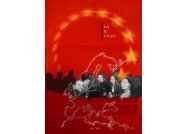turkish-greek civic dialogue - AEGEE Europe
turkish-greek civic dialogue - AEGEE Europe
turkish-greek civic dialogue - AEGEE Europe
Create successful ePaper yourself
Turn your PDF publications into a flip-book with our unique Google optimized e-Paper software.
66<br />
People of my age did not present these traits when they were young, e.g., in the<br />
1960s and 1970s. On the contrary the youth of that period was demonstrating<br />
in the streets for various national ideals and worries. They were tense; in<br />
the sense that they were under the urge to fight for some ‘rights’ that they<br />
believed were seriously endangered by “the Other”.<br />
I do not remember any contact that took place at that time between the young<br />
people of Greece and Turkey. Actually contacts of this kind were not popular<br />
among any age group at that period.<br />
The youth of present time seems different from their parents and the explanation<br />
rather lies in the milieu they were brought up. Starting from hundred years<br />
ago, the subsequent generations had faced political crises connected to the<br />
Other. Wars were fought between the Greeks and the Turks. One can remind<br />
the war of 1897, the annexation of Rhodes by the Greeks in 1908, the Balkan<br />
Wars in 1912, the Greek-Turkish war in Anatolia in 1919-1922, the Cyprus crisis<br />
and the related fights that lasted for decades and ended with a war in 1974.<br />
During this period the ethnic minorities in Greece and Turkey faced the rage of<br />
the local populations and the negative discrimination of their governments.<br />
My generation was brought up listening to stories related to the above. If one<br />
excludes the Imia/Kardak crisis, which eventually ended by avoiding an armed<br />
clash, the latest generation, i.e., the young people who are today around 20-25<br />
years of age, are luckier. They were not brainwashed with negative narrations<br />
and stereotypes about the Other.<br />
They are different from their parents in ‘lacking’ same characteristics: they<br />
are less fanatical, less nationalists, less biased, less ‘sensitive’ – in the sense<br />
that they are not paranoiacs – and especially less worried.<br />
Self-confidence is an asset in bilateral relations. The political situation in<br />
<strong>Europe</strong> in the last fifty years and especially the long-lasting peace in the<br />
area contribute positively in building up trust between neighboring countries.<br />
The dynamics of the <strong>Europe</strong>an Union, i.e., on one hand the ‘union’ that was<br />
accomplished among countries that were once ‘eternal enemies’ and on the<br />
other the prospect that this model might be applicable to many other cases,<br />
created a new atmosphere in international arena.<br />
The young people of present time carry the mark of this hope. This new<br />
generation heard some new expressions, such as peaceful coexistence,<br />
conflict resolution, empathy, the Other, prejudice against the Other, images<br />
in textbooks, i.e., concepts that are popularized rather recently and that did<br />
not exist before. They are brought up with them, whereas these concepts were<br />
unheard in the time of my father. As for me, I heard about most of them<br />
only after a finished my studies. The optimistic concept of ‘win-win’ and the<br />
discredited ‘zero-sum’ are familiar today to many of our young girls and boys.<br />
Therefore, it is not the ‘age’ of the people in the sense of ‘how old they are’<br />
that makes the difference but the age in the sense of ‘era’.<br />
Naturally if not all, the great majority of the people I met in the youth<br />
organizations that were involved in Greek-Turkish relations appeared like a<br />
sign of hope for more balanced bilateral relations. There is no doubt that these<br />
young people at a certain phase of their lives have met the old-style negative<br />
propaganda against the Other. They have read the textbooks that my generation<br />
prepared, they listened to the accusations or insinuations against the Other<br />
from their parents and other relatives, they followed the mass media where<br />
exaggerations and bias still persist. But this ‘education’ was not accompanied<br />
by the every-day concrete happenings that reproduced and reinforced the<br />
nationalistic narration. The older generations, in their youth, could match the<br />
nationalistic myths with the contemporary political developments.<br />
The new generation is brought up with new values: for example ‘peace’ and not<br />
‘our historical military victories’ or ‘our power’ gains credit the last decades.<br />
This is a revolutionary shift in values that are connected to the community and<br />
to the individuals. This change did not occur by chance; it is the result of the<br />
new prospects that our society renders to its citizens.<br />
People have much to lose in our days: a life where the basic needs are provided<br />
(a home, food, heating, even air-condition for many), leisure even every<br />
weekend - the word ‘weekend’ is a new one -, benefits that were unheard in the<br />
time of my parents such as free medical care, compensation for unemployment<br />
and eventually a pension that secures a decent life even if one can not work.<br />
In spite of all shortcomings and complaints, these innovations create a new<br />
optimistic prospect for a more relaxed life that was not even a ‘dream’ for<br />
Rebuilding Communication Association des Etats Généraux des Etudiants de L’<strong>Europe</strong>







